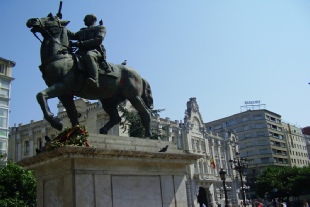
|
What must it be like to live under a totalitarian regime? And what, exactly, is fascism? These are just two of the questions to ponder throughout this year, as Spain celebrates
fifty years since the death of fascist dictator Francisco Franco. Pedro Sánchez inaugurated
the year- Fascism is the third political force in Europe? Of course Sánchez doesn't actually mean that. He is referring to parties with right wing ideologies which, for the European left, apparently makes them fascist. The Spanish right is equally loose with language when it refers to anything left of the PSOE as communism. But Sánchez's remark is not only historically inaccurate; it also undervalues the freedom in which we live today by implying that fascist forces are on the brink of propelling everyone back to the 1930s. My Mum was a language student in Bilbao in the early 1970s, during the last few years
of Franco's rule. One evening, as she drank with friends in a bar on the Alameda
de Urquijo, a gang of the dictator's armed thugs burst in. They raided the rooms
upstairs and hauled several people out with force - |
|
|
That's fascism: living with the knowledge that the state might come to get you and your family at any moment, for any or no reason at all. I feel safe in saying that nobody (and obviously I include myself in this) who hasn't lived under such a regime has any idea of how frightening and stultifying it must be. Fascism originated in Benito Mussolini's Italy. As an ideology it is hard to define, but in every country in which it has dominated, three particularly pernicious elements can be identified: contempt for and militaristic suppression of ideological plurality, democratic and legal institutions and individual liberty. Comparing modern- It's striking, though, that the political forces which today advocate hardest for
censorship and ideological uniformity - |


